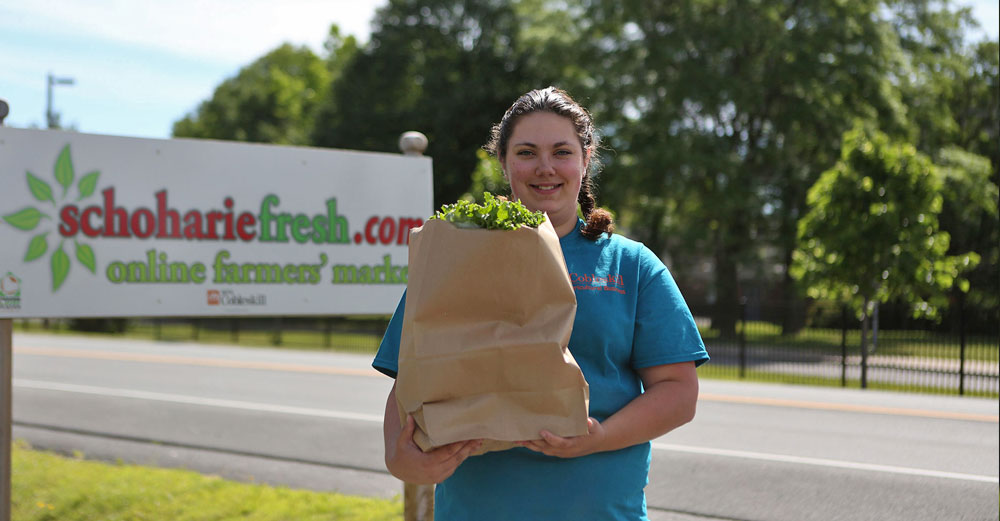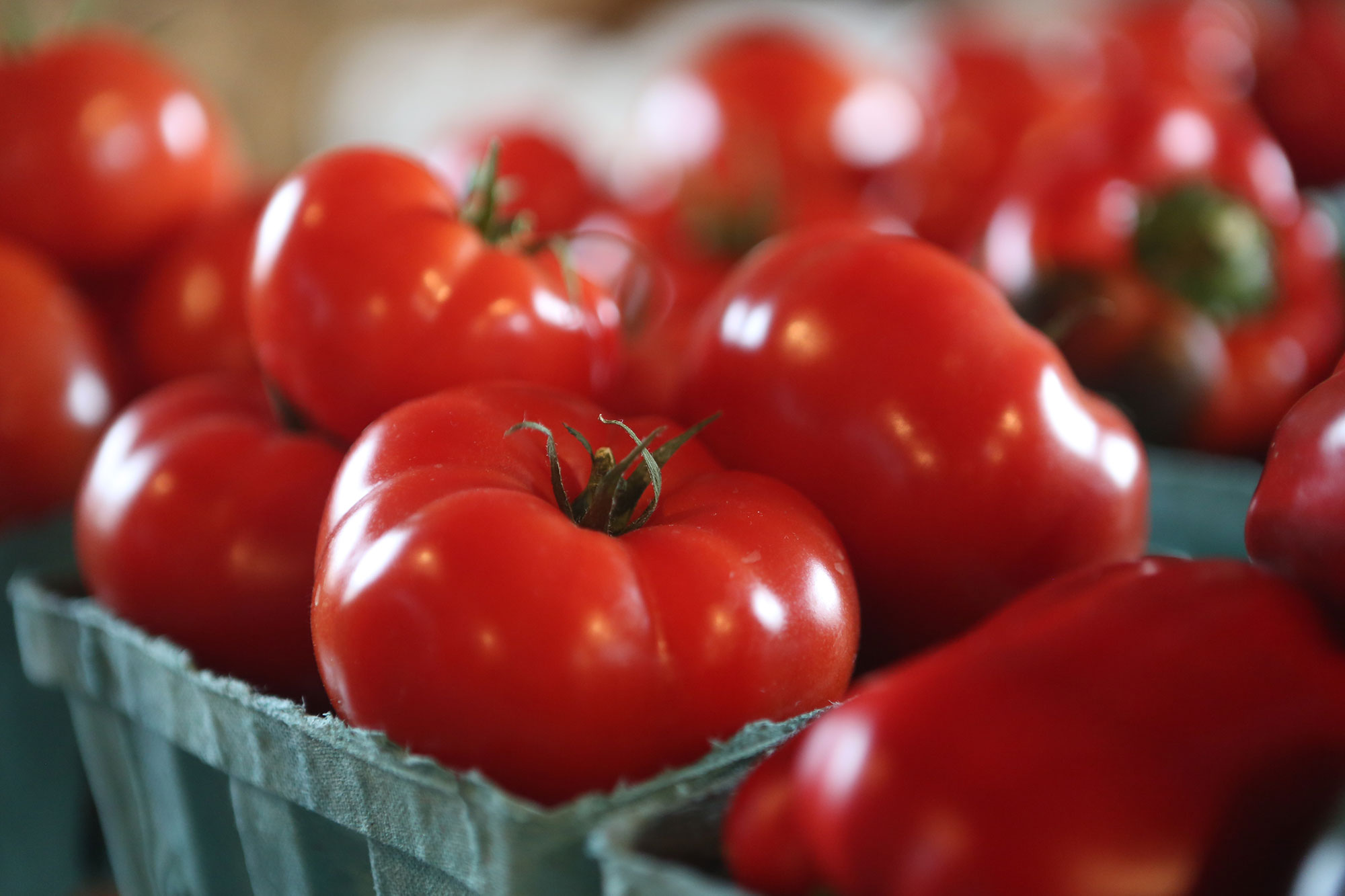
Over the past decade or so, there has been a strong push to get back to our roots by getting our food from trusted, local sources. Farmers’ markets continue to pop up in our local communities, at our places of work, and on college campuses so that we can take advantage of buying fresh, clean produce straight from the source: our local farmers.
In addition to farmers’ markets, the farm to table movement, which began back in the 1960s and 70s, has become increasingly popular as of late. While the name is somewhat self-explanatory, you may be wondering “what does farm to table mean, exactly?” Essentially, restaurants participating in farm to table ensure that they get their produce and food items from local farms. The industry is evergrowing and is becoming more popular nationwide, and especially so in the state of New York thanks to our diversity of crops and farms.
As such, many SUNY campuses host on-campus farmers’ markets and provide fresh produce to students. In particular, SUNY Cobleskill offers an online farmers’ market with their café and general store, both stocked with campus produced produce and handcrafted items.
To better understand how SUNY Cobleskill contributes to the (online) farmers’ market and farm to table movements, we spoke with Jason Evans, Assistant Professor of Agricultural Business Management, and Michael Lapi, Chef and visiting Chef Instructor.
Tell us about your online farmers market, Schoharie Fresh, and what services it provides, and what inspired the idea of an online farmers market?
 Jason: The idea of an online farmers’ market came about as part of a grant proposal to the NYS Department of Health‘s “Creating Healthy Places” initiative in 2010. The proposal included several other components as well, all designed to enhance access to physical activity, recreation, and healthy food in Schoharie County. The convenience of the online market was a key factor—customers can place orders throughout the week and pick them up at one of three locations in the county on Friday afternoons. SUNY Cobleskill was awarded the grant and has since won a renewal, though Schoharie Fresh hasn’t been funded by the grant since 2013.
Jason: The idea of an online farmers’ market came about as part of a grant proposal to the NYS Department of Health‘s “Creating Healthy Places” initiative in 2010. The proposal included several other components as well, all designed to enhance access to physical activity, recreation, and healthy food in Schoharie County. The convenience of the online market was a key factor—customers can place orders throughout the week and pick them up at one of three locations in the county on Friday afternoons. SUNY Cobleskill was awarded the grant and has since won a renewal, though Schoharie Fresh hasn’t been funded by the grant since 2013.
The market was originally housed at Cornell Cooperative Extension in the summer of 2011 but only operated for a couple of months before Hurricane Irene happened. In summer 2012, the market was moved to our campus where it has operated since.
The market offers a wide variety of products from about 35 producers in Schoharie County, including products produced in the campus’ meat labs and greenhouses, and it operates year-round except for a short break from mid-December to mid-January when students aren’t on campus. We keep a small student staff on board for the summer.
Though the impetus for the market was to provide convenient access to local, healthy foods, the initiative has become an important secondary marketing venue for our producers. Each week, producers are automatically alerted to bring ordered products to campus, and drop-off usually takes less than five minutes. This is far more convenient and less costly than setting up at a traditional farmers’ market with no assurance of what or how much will sell.
Tell us about the Carriage House Café and General Store.
J: The Carriage House Café and General Store have campus-grown produce, meat and dairy products; pastries and deli items from our culinary arts program/students; and food and non-food items (knitteds, candles, soaps, etc.) from a selection of our existing Schoharie Fresh producers. We also offer a self-service coffee bar, and seasonally, nursery/floral items from the plant science program.

Are students able to get involved with Schoharie Fresh and the Café? If so, how?
J: Yes—we have one paid student managing Schoharie Fresh at all times; we fill in during the regular semesters with volunteers from the Ag Business Club. The café will be staffed entirely by students via a “Retail Practicum” course taught by Dr. Sophie Winter of the Agricultural Business Management program, who, in turn, will be the students’ supervisor in the facility along with our adjunct professor, Nick Kossmann. It will likely be possible for student entrepreneurs and artists to also sell product via the café once we’re up and running.
What goes into raising and producing foods on campus/surrounding farms?
Michael: For myself, I teach in a very unique situation. Dealing with USDA and students through the process of slaughtering animals is a very trying situation. Safe animal handling is of most importance. Demonstrating the act of death as a very respectable practice is my first intention. When a student is able to see the transition from field to plate, they begin to understand why our food system is so important.
I also have an opportunity to work hand in hand with the producers. What stands out to me are the relationships forged along the way, knowing everyone involved from farmer to butcher to the consumer has the best intentions for the end result.
J: Unfortunately, quite a lot of money and labor. 🙂
What are the benefits of getting produce and other food from farmers’ markets and local farms?
M: The benefits are some of the best rewards of living a healthy meaningful life. You are creating social ties and supporting your local farming community. Knowing where your foods are produced gives value to health and positive living.
J: Buying locally means that money stays and works within our community. If our farms are more viable, so are all of the other local businesses that serve farms like farm input supply stores, fuel stations, equipment dealers, and the like. Local also means fresher and tastier, since the produce doesn’t have to be artificially ripened in transit and bred to withstand a cross-country trip.
What are the benefits of dining at a farm to table establishment?
M: You will be supporting a local business and farms at the same time. You will also be eating healthy, seasonally prepared foods that are ultimately better for you.
What tips do you have for getting the most out of your farmers’ market experience?
M: Get to know your farmers around you and surrounding areas. Immerse yourself in seasonality and buy bulk when you know its something that preserves well. Think outside of the box and try something new you’ve never had before. Experiment with new concepts like dehydration, fermentation, and charcuterie. Embrace food as the most important form of health.
J: Buying in-season and preserving means low-cost meals year-round.

In addition to Schoharie Fresh and Carriage House Café and General Store, SUNY Cobleskill also hosts events that focus on farm fresh foods and collaborating with local culinary institutions. The 7th annual Culinary Extravaganza is one such example of this effort, which is taking place on Friday, October 19 from 6 – 9 pm, and the theme is “Tastes of America.” SUNY Cobleskill Culinary Arts students will work alongside with some of the region’s premier culinary talents, and new this year, the Extravaganze will include a student-chef competition, silent auction of culinary experiences, and assistance from Mazzone Hospitality. “Tastes” will feature appetizers, entrees, and desserts, as well as wine and beer tastings.




Its so amazing to see enthusiasm for farm to table, besides Trader Joe’s and Whole Foods, I get my produce from the pop up farmers market everytime I get a chance.